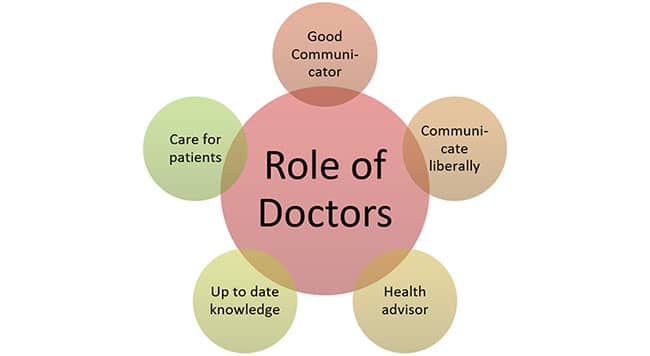How to become a doctor
How to become a doctor..? A doctor is a person who practices medicine, do treatment and diagnosis of patients. The word doctor not only signifies a noble profession. But also gives a belief to the patient’s family members that they have given the patient’s life in the hands of God. The doctors are equated as God. Actually, the work of a doctor is to cure the illness of the patients. The doctors are doing their job in a selfless way. So, that every patient before leaving the bed of the hospital always wants to say “Thank you” the doctor. The word “Thank you” itself means the patient’s gratitude towards their doctor.

Before becoming the doctor, you should know certain things which may be very useful to you. Candidates will get admission in MBBS College according to their rank and to other Medical courses like BDS, BHMS, etc. AIIMS and JIPMER conduct their own Entrance examination.
Eligibility Criteria
- At First, you have to take admission in Medical College after passing class 12th and have to clear the Entrance Test i.e. NEET Exam (National Eligibility cum Entrance Test).
- NEET Eligibility Read more
- Candidate Age should be 17 years old.
- Candidate must be passed your 10 + 2 with Science stream (Physics, Chemistry, Biology and English). With 50% marks for unreserved candidates, 40% for SC, ST and OBC and 45% for PWD Candidates.
- Candidates who have studied from abroad and want to study in Indian Medical Colleges should have passed Physics, Chemistry, Biology/Bio-technology and English up to 12th standard with 50% marks determined by Association of Indian Universities (AIU).
Duties of Doctors
- Maintaining the patients record and keep them confidential.
- Handling the patients with patience.
- Planning treatment requirements.
- Promoting health awareness.
- Monitoring their patients.
- Safety of the patients during surgery.
- Avoid taking advantage of being a doctor.

Role of Doctor
The role of a doctor doesn’t end inside the hospital, it continues outside of hospital too. The doctor should always have the right and up to dated knowledge so, that they could convey the genuine information to their patients and to the society. Always aware people and society towards health care. Not only the doctor’s treatment heals the patients but also their words can heal the patients mind. The doctor should be a good communicator so that the patients can communicate with the doctor liberally.

Some of the tips need to know to become a good Doctor/Surgeon
- Do not try to have a Systematic Appointment System: If you give a time slots to patients when they come on time and are attended to promptly are “Western” things. They don’t work in India. At first patient may not turn up (and not even bother to call you), but even more relevant, even if they do, they will think you have not got enough work if your clinic is not full of patient and you do not make them wait for hours. Our suggestion is not to have any appointment system, make sure patients have to wait for at least a couple of hours before you attend them, and if it is possible, attend two, three, even four patients at the same time in your “chamber”.
- Don’t be polite to your Patients: This is a very simple trick that you let your patients know you exist but when you get them, you act pricey as that is the only way you are likely to get them to give respect to you. Speaking to patients politely is a sign of weakness and any “famous” doctors should never have to indulge in this sort of behavior. On the other hand, if you treat them with a little disrespect and show them how meaningless their “illness” is to your practice, you are more likely to successfully woo them.
- Personal Wealth and Worth: If your patient discovers that your vocation depends upon him/her coming to you, they are probably going to underestimate your efforts. Give us a chance to confront it; patients come to you, not on the grounds that you are good, but since you are rich and famous and can perform miracles. Additionally, who is the best individual to enlighten them about these aspects of your life.
- Do not give any patient more than 5 minutes: There were the days, when patients use to give value to a doctor who listened to them actively, took time to examine them, and explain issues to them clearly. Now-a-days patients value doctors who act like “Gods”. Does God ever explain to you why he is doing to you whatever he is doing?
- Try not to Tell Patients about Your Experience: Only a weak and irrelevant surgeon would stoop down to the level of educating a patient about his experience. It’s not their concern in any case. If you are really proud of what you have done and feel like sharing your things with your patients, at least make sure you magnify them manifold. This isn’t because you need to mislead your patients but since your patient will consequently divide whatever number you give them by five to get closer to reality and you don’t generally need them to underestimate you, isn’t that right?
- Overemphasize Claims Regarding Surgery: Remember your patient does not want a surgery that does not give 100% success and total cure. It doesn’t matter if your surgery is the best treatment; what is more important is that your patient must think this to be the only option they have if they want to be alive, and without it, death would almost be inevitable.
- Try not to Tell Patients about Risks of Surgery: If you disclose to them anything about complications, they will get confused! Would you truly like to befuddle a patient, do you really want to confuse a patient, who may decide against your life-saving surgery? Patients would prefer not to know anything about complications of surgery procedure and as a rule, if a surgeon tells them that. My recommendation will be to totally avoid making this kind of deadly blunder in your practice. Simply request that they sign on the dotted lines five minutes before the surgery.
- Mention all the Degrees on Your Letter Head: If you have been on a 3-day course, after which they give out degrees. Go for it and mentions them outside your clinic, in your letter head, on your website, and anywhere else you can discover. Most patients don’t have the difference between a Fellow of Royal College of Surgeons of Edinburgh who has trudged for a 12 years after MBBS to get it and pays 250 pounds each year to the college to be able to utilize the title and “Fellow of Global Medical University” (obviously it doesn’t exist or in the event that it does, I am not mindful of it), the title you purchased on the Internet for ₹ 5000. Write as many of these abbreviations as you can on your visiting card; it goes a long way in convincing a patient about your credentials. Also, in the event that you went to a created nation for a 3-day conference or course, the name of that country should be everywhere around you. This is esteem expansion by association. Patients will never discover what you did in UK at anyway, so simply notice the two letters in the event that you can.
- Compose Conferences and Meetings and Broadcast them: Make sure you network with some colleagues, ideally in some other city (so you are not competing with them) and invite each other to conferences and meetings. Take it from me, it really doesn’t make a difference in the event that you and your colleague have never written any academic article or even read one in last 5 years. What is more significant is that you send free passes to some recognized speakers in US/UK to attract a bit of crowd and ask your friends in local media to cover the event.
- Organize Training Courses: Your patient must realize that in addition to the fact that; you are a talented specialist an all-inclusive perceived instructor and mentor. If you think, you need to first learn it yourself and then teach it, forget it; it will be too late by then. Remember the old adage, “See one, do one, teach one”.
Author: Rima Kochar

Great article. Learned a lot from this website. I really appreciated your content about how to become a doctor and what is the meaning of this. Thanks for sharing.
Thanks. We really appreciate your effort to visit our website and review our content.
You may also follow us on Social Media Platform: facebook, twitter and instagram.
Great article? Do check it out!
Thanks ❤
I work with pre-meds regularly and this is good advice. #6 especially, our advisors always say its preferable to take less classes and get better grades. It’s hard to keep life balanced, stay sane, and get into medical school at the same time, but possible!
Hey there, it’s nice to hear from you. As you work with doctors your duty doesn’t end inside the hospital, it continues outside also. Its admirable how doctors balance their life, stay sane at the same time.
Thanks and if you find any bit of this blog helpful share it with others too..!
It gives us a push..!